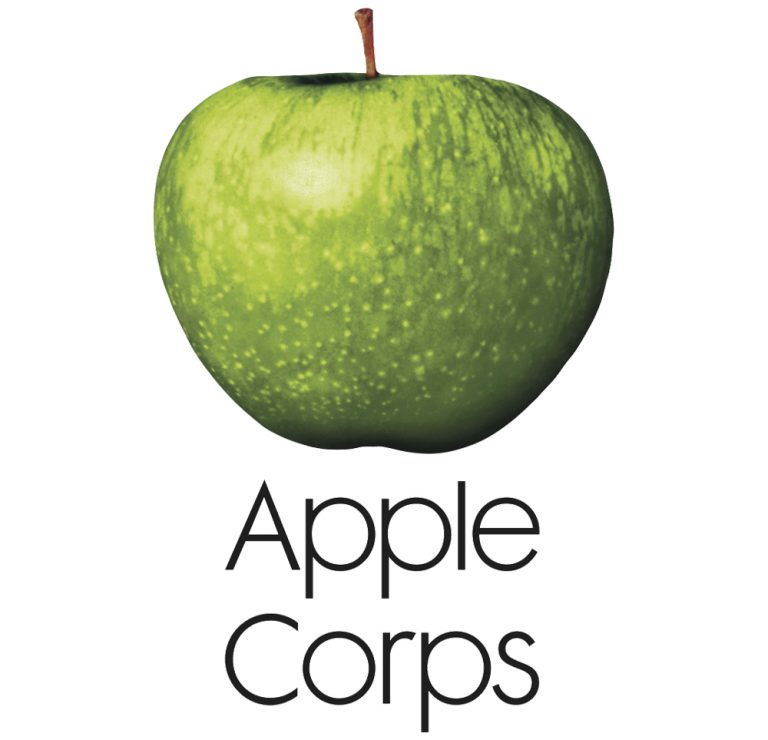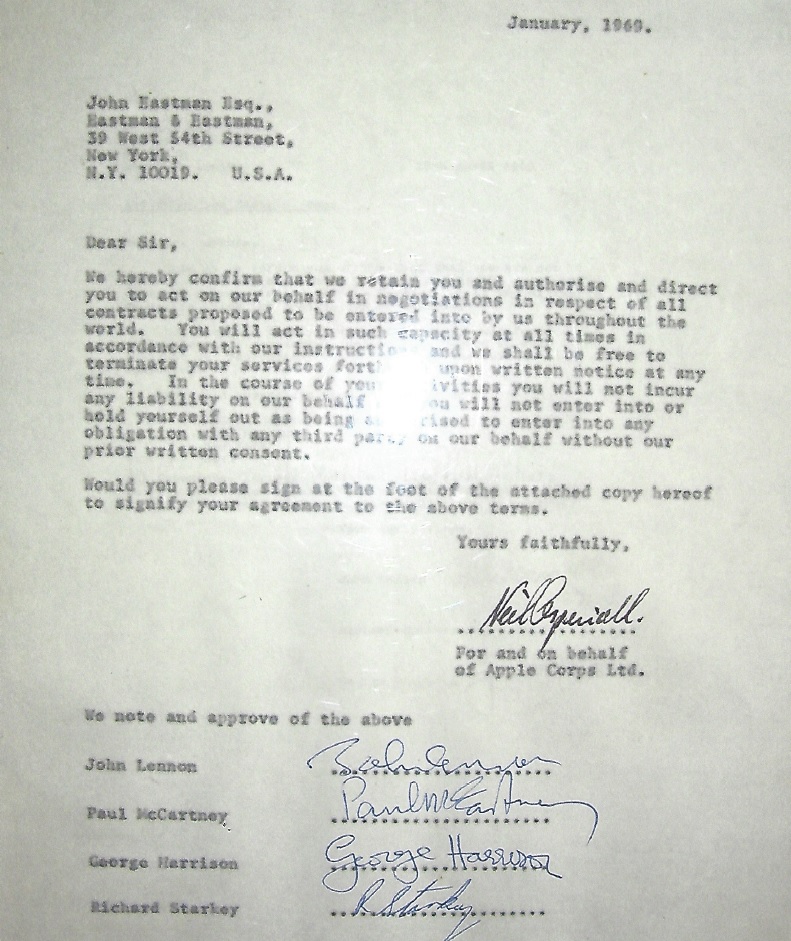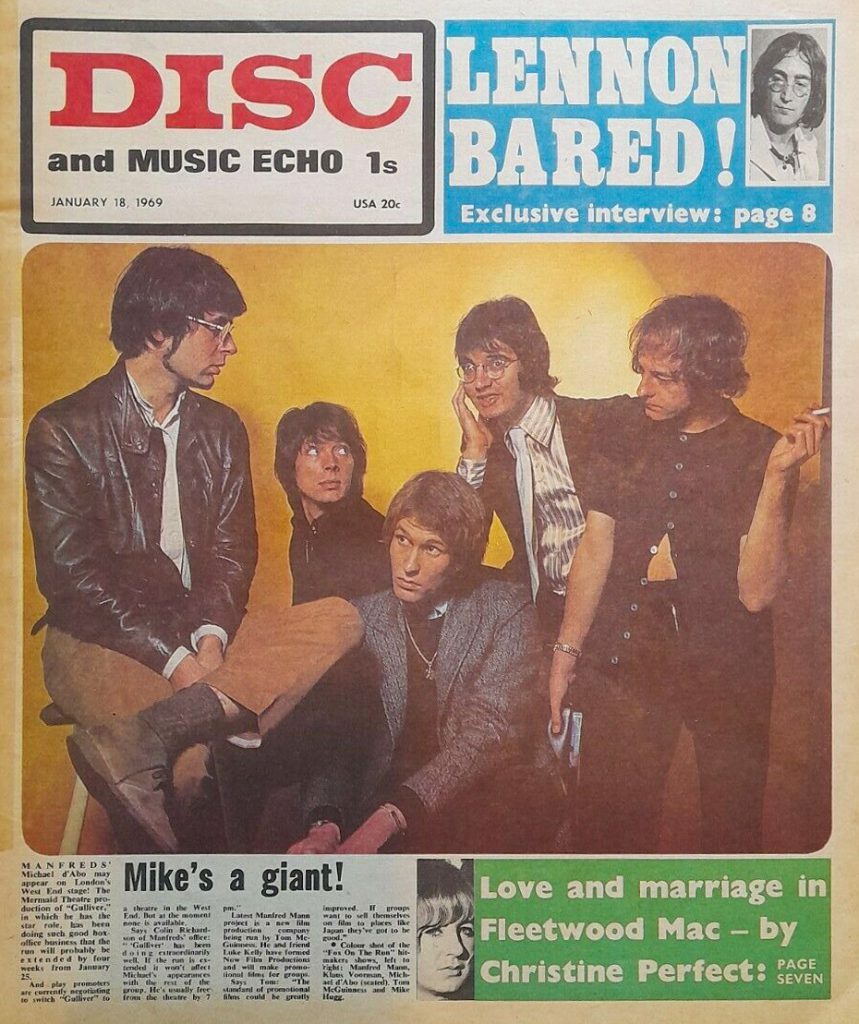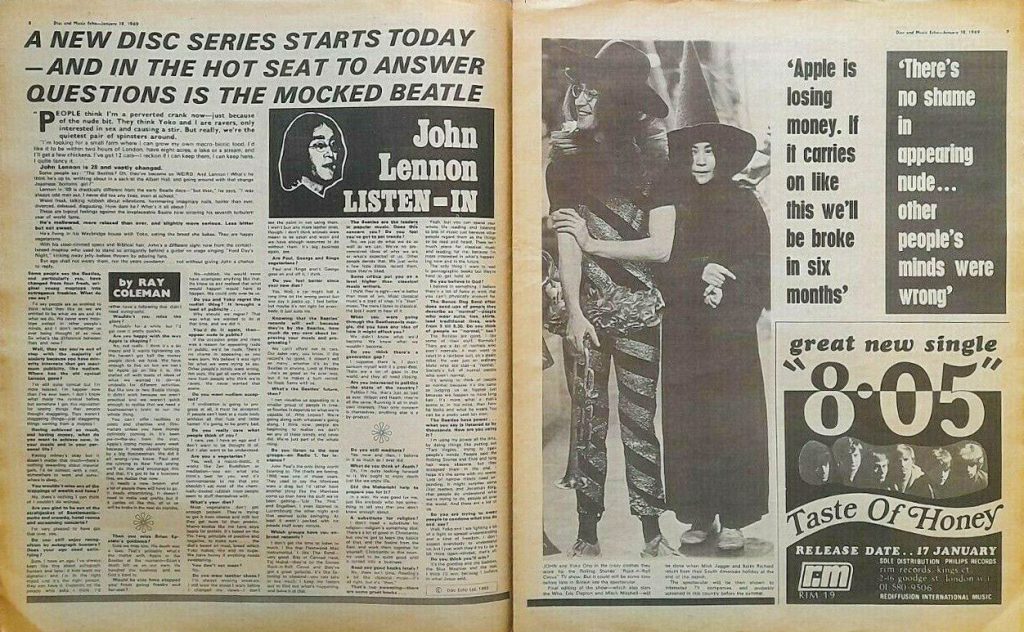
January 1969
Apple’s business problems become public knowledge
Last updated on February 5, 2022

January 1969
Last updated on February 5, 2022
Previous article December 11 - End of December, 1968 • Paul McCartney and Linda Eastman on holiday in Portugal
Single Dec 20, 1968 • "The Beatles 1968 Christmas Record" by The Beatles released in the UK
Article January 1969 • Apple's business problems become public knowledge
Session January 1969 ? • Recording "Lontano Dagli Occhi"
Interview 1969 • Paul McCartney interview for The Observer
Next article January - February 1969 • First mentions in the press of the “Get Back / Let It Be” sessions
Fall 1968 • Apple faces business problems
January 1969 • Apple's business problems become public knowledge
Jan 12, 1969 • The Beatles meet together to discuss their personal and business problems
Jan 27, 1969 • Allen Klein meets with John Lennon
Jan 28, 1969 • Allen Klein meets with The Beatles
Feb 01, 1969 • Allen Klein, John Eastman, and The Beatles discuss about NEMS
January to February 17, 1969 • NEMS / Nemperor is sold to Triumph Investment Trust
February 21 to August 1969 • The Beatles fight for NEMS / Nemperor
March 1969 • Dick James sells his Northern Songs shares to ATV
Mar 21, 1969 • Allen Klein becomes business manager of Apple
April - May 1969 • The Beatles and ATV fight for the control of Northern Songs
September to November 1969 • ATV finalizes its acquisition of Northern Songs
In the fall of 1968, it became obvious to Apple’s management team and therefore to The Beatles that the company was bleeding money and the situation was becoming unsustainable. At the initiative of Paul McCartney, The Beatles then started to look for a new manager for Apple. But Paul soon became convinced that Lee Eastman, a New York-based attorney with experience with music copyrights and his future father-in-law, should be put in control of The Beatles’ financial affairs. Lee Eastman indeed had the relevant experience.
The other Beatles were not comfortable with the idea that Paul’s future father-in-law would run Apple, but in early January 1969, they agreed to have Lee Eastman and his son John as business advisors for a short while. They all signed a document (maybe during their January 12 meeting) giving the Eastman & Eastman law firm rights to negotiate contracts on the Beatles’ behalf.
Paul had been agitating for some time for a new manager for Apple. He was fed up with the way that the company was being run and he asked his future father-in-law, Lee, to recommend someone to put the house in order. Lee, of course, recommended his son, John.
Nat Weiss – Beatles attorney – From “The Beatles: Off the Record” by Keith Badman
I put the Eastmans up. I thought they would be fair. For one thing, they are lawyers. They don’t take percentages, they take a fee. So, they manage you, and, at the end of the year, they put in a bill. And, if you don’t like them, you don’t pay the bill. Well, you pay the bill, but you sack them for the next year.
Paul McCartney – From “The Beatles: Off the Record” by Keith Badman
[Lee Eastman] would have been good business-wise, but of course he would have too much of a vested interest. He would have looked after me more than the others, so I can understand their reluctance to get involved with that.
Paul McCartney – From “And In The End” by Ken McNab
John Eastman gave me the impression of being an inexperienced, somewhat excitable and easily confused young man. We all knew of Paul’s friendship with the family … I was against the idea of having, as manager, anyone in such a close relationship with any particular Beatle, but, apart from that, they did not strike us as having the right experience or knowledge for the job which had to be done.
John Lennon – From “The Beatles: Off the Record” by Keith Badman
John Eastman would use those rights to negotiate the acquisition of Brian Epstein’s former company NEMS Enterprises. But all those ideas – John and Lee Eastman as Beatles business manager, buying NEMS – would be derailed with the arrival of American businessman Allen Klein.

On January 13, 1969, an interview of John Lennon by Ray Coleman was published in the Disc & Music Echo magazine, making Apple’s business problems public for the first time:
Are you happy with the way that Apple is shaping?
No, not really. I think it’s a bit messy and it wants tightening up. We haven’t got half the money people think we have. We have to live on, but we can’t let Apple go on like it is. We started off with loads of ideas of what we wanted to do, you know, an umbrella of different activities. But, like one or two Beatles things, it didn’t work out because we weren’t quick enough to realise that we needed a business brain to run the whole thing. You can’t offer facilities to poets and charities and film plans unless you have money coming in. It’s been pie-in-the-sky from the start. Apple’s losing money every week because it needs closely running by a big businessman. We did it all wrong, you know, Paul and me running to New York, saying we’ll do this and encourage this and that. It’s got to be a business first. We realise that now. It needs a broom and a lot of people there will have to go. It needs streamlining. It doesn’t need to make vast profits, but if it carries on like this, all of us will be broke in the next six months.
Then, you miss Brian Epstein’s guidance?
Sure we miss him. His death was a loss, and that’s probably what’s the matter with Apple or The Beatles at the moment. Brian’s death left us on our own. He headed the business, and we find it hard to. […]
We have enough to live on, but we can’t let Apple go on like this. We started off with loads of ideas of what we wanted to do… but like one or two Beatles things, it didn’t work out because we aren’t practical, and we weren’t quick enough to realize we needed a businessman’s brain to run the whole thing.
John Lennon – Interview with Disc & Music Echo editor, Ray Coleman, January 13, 1969


Even if John was lucid about their state of affairs, the other Beatles felt they needed to do some damage control, following this interview:
When John said we’d be broke in six months, it was just a figure of speech indicating that we’d have to wake our ideas up.
Paul McCartney – From “The Beatles: Off the Record” by Keith Badman
Beatles John Lennon and George Harrison did NOT have a punch-up [during the “Get Back” sessions held in January 1969] and Apple – their business company – is NOT on any financial rocks. The denials came last night from The Beatles themselves. It all began when a pop weekly reported Lennon as saying that Apple was ‘losing money every week’, and needed tightening up. Then came the rumour that Lennon and Harrison had come to blows. But, last night, after a five-hour meeting between the four Beatles and their business associates at Apple’s Savile Row headquarters, explanations came fast. George Harrison said, ‘Apple has plenty of money – we all have. When John said we were losing money, he was talking about giving too much away to charities. We have been too generous and that’s got to stop. The so-called punch-up between John and myself? There’s no truth in it. We are still good friends.’ John Lennon, who left with Yoko Ono, said, ‘Any rumours about Apple folding were nonsense.’ But he added, ‘There will be changes and it’s all going to be very exciting.’ Ringo Starr called the story of a punch-up, ‘A load of old rubbish!’ He said, ‘I was there when it was supposed to have taken place. It’s quite untrue.’ The fourth Beatle, Paul McCartney, said of the long meeting, ‘There was nothing sinister about tonight. It was simply a business discussion.’
Daily Express – January 16, 1969
The main consequence of this article was that it gave the signal to American businessman Allen Klein, manager of the Rolling Stones and other acts, that his time had come: he had tried at many occasions to be involved in The Beatles’ […]
Also around that time, in January 1969, and likely following guidance from Lee Eastman, Paul McCartney became interested in the music publishing business and purchased several thousand shares in Northern Songs without telling the other Beatles. It would be an unpleasant surprise for John Lennon during the fight for Northern Songs in April 1969.
It was the first time that any of us had gone behind anyone else’s back. When I asked Paul why he was buying these shares, he said, ‘I had some beanies and I wanted more!’
John Lennon – From “The Beatles: Off the Record” by Keith Badman
I once bought some Northern Songs shares. John and I once said if we ever wanted to invest in anything, the best thing to invest in were ourselves. Lennon-McCartney, that’s the best thing to invest in. If we get a chance, we’d buy some shares. One day, I rang up Peter Brown and asked him to buy some shares. It was like two hundred or something. It wasn’t a major holding or anything. In the end, the big game was on and we were in big boardrooms with Mr Klein and it was deadly serious and suddenly, it came up. ‘Oh, Paul bought some shares!’ And I said, ‘Well, yeah, it was all right, wasn’t it?’ And they accused me of trying to corner a market, or something, and it went down like that. John definitely thought that. If I had wanted to corner a market, I would have bought more bloody shares than two hundred!
Paul McCartney – From “The Beatles: Off the Record” by Keith Badman
Paul would soon create his own standalone company to start investing in music publishing and buying up the copyrights of other artists.
The Beatles Diary Volume 1: The Beatles Years
"With greatly expanded text, this is the most revealing and frank personal 30-year chronicle of the group ever written. Insider Barry Miles covers the Beatles story from childhood to the break-up of the group."
We owe a lot to Barry Miles for the creation of those pages, but you really have to buy this book to get all the details - a day to day chronology of what happened to the four Beatles during the Beatles years!

Notice any inaccuracies on this page? Have additional insights or ideas for new content? Or just want to share your thoughts? We value your feedback! Please use the form below to get in touch with us.